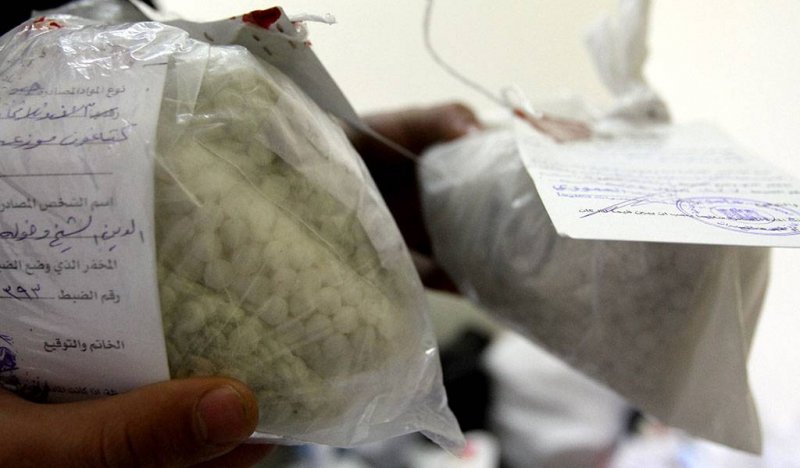May’s journey with addiction began about two years ago. Aged 23, she hails from Jabal al-Arab in the south-west of Syria.
“I am a university student from a conservative family. If my family were to find out about my addiction, they would kill me, and my reputation would be destroyed,” she tells Raseef22. She lives on campus in the heart of Damascus, and her monthly allowance is barely enough to cover her basic living costs. Her history with drugs began with recreational use of hashish, but she soon switched to Captagon—a far cheaper option, at $0.4 per pill. “This is all I can afford, and the five pills last me a week, which is good enough, in the absence of other alternatives. I can’t check into a clinic for rehabilitation, for fear that the scandal would become known,” she says.
In Syria
Drugs are not produced in Syria, though it acts as a crossroads for the flourishing hashish production in the region. Recently, psychotherapy drugs have become a prevalent alternative for narcotics, despite the fact that they are generally not dispensed without a prescription. Among these are are antipsychotic pill benzhexol and diazepam (offshoots of Valium), as well as Codeine cough syrups. According to Syrian Law, people who suffer from drug addictions are considered psychologically ill, and are not penalized as criminals.
Penalties are reserved for dealers, with sentences as high as 15 years, according to the Penal Code of 1949. Justice departments and anti-drug units deal with an average of 50 to 60 cases per day, all of which are related to drug abuse or trade, an official source affirms to Raseef22, speaking on condition of anonymity. Miraculously, the statistics of the Ministry of Interior claim that the instances of drug abuse and addiction in the country are isolated cases, and that the rate does not surpass 51 people in every million.
Drugs and War
According to various medical, judicial, and official sources, the rates of drug abuse have increased significantly since war erupted especially among students. The situation in Syria resembles that of many societies during wars and conflicts, such as Lebanon, Yemen, and the former Soviet Union. Ali Maarouf, who specializes in the treatment of addiction in Syria, believes the danger lies in the aftermath of the war. In his opinion, drugs will become even more widespread after the war ends. “We are in contact with numerous cases of alcohol and drug addiction, and we’ve made every effort to try to treat these cases,” he tells Raseef22.
Is War the Cause?
The common factor shared among those who have began abusing drugs within the past six years is the desire for an escape from the conditions of war. Ahmed, 24, is a fourth-year civil engineering student who began smoking hashish about two years ago.
Despite the difficulty involved in obtaining hashish, he has found a smuggler to provide it for him, concealed inside a book that he secretly hands over at a previously decided location. “It’s a very difficult task, but in a war like this one, you look for anything to make you feel happy, even momentarily, and able to continue studying,” he says.
As for Nada, a pharmacist from Sweida, she became addicted to Captagon and hashish, despite her knowledge of their harmful effects. “I will try to get treatment for my addiction; I can’t continue. I have a future, and a family, and work, but now I’m caught and I can’t stop. I have no outlets for happiness but drugs; I’ve come to depend on them,” she says. “Damn this war, it’s left us with no chances for happiness.” Psychiatrist Darwish Samea’ comments on the relationship between war and drugs, saying that wars drive people to abuse drugs because they live in a state of despair and a sense of futility. He further notes that European countries went through a similar difficult stage in the aftermath of World War II. “When people find that there is no purpose to their lives, drug culture prevails,” he concludes.
Raseef22 is a not for profit entity. Our focus is on quality journalism. Every contribution to the NasRaseef membership goes directly towards journalism production. We stand independent, not accepting corporate sponsorships, sponsored content or political funding.
Support our mission to keep Raseef22 available to all readers by clicking here!
Interested in writing with us? Check our pitch process here!





